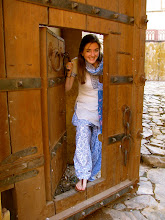This week I spent half a day at Freedom Training, a three-day series of workshops and interactive lectures led by IJM social workers -- intended to instill basic knowledge and begin the fragile process of rebuilding the lives of newly released forced laborers. My moleskine is filled with facts and quotations I scribbled down, pestering the patient staff to translate and repeat answers. This entry was jotted down among these notes.
Sometimes I still have moments where I have to blink a few times really fast and whisper aloud "This is where I live." Like right now. I'm sitting in a large cement room, lit by fluorescent tube lights and cooled by eight plastic ceiling fans. Cooled, of course, being a geographically relative verb. The voices filling this space are laughing now, some comment about cigarettes or insight into substance abuse shared by the IJM social workers has struck a chord. The men laugh a deep, admitting laugh; the women laugh a knowing laugh and then exchange glances with one another, settling back into their plastic chairs with placid eyes on tired faces. The babies are antsy. Tired, perhaps, or hot and hungry.
I'm watching one woman now, her tiny arms believable only when I stare at her proportionally tiny face, pretty features pinched into narrow symmetry. The baby she now feeds at her tired breast was born in July, the day before this family of four and four other families were brought out of the rice mill where they laboured, endlessly tired, illegally and hopelessly trapped as bonded labourers. Her husband is also well-kept, his somehow still white shirt hanging, billowing almost, over his jagged frame. Their daughter is in his arms, fussy and not allowing him to sit down.
The slide that's projected on the wall has pictures and words explaining dependence on and tolerance of alcohol. I think of the documents I read last night, in my cool A/C bedroom, on my cool iBook laptop, to prepare for the interviews I'll do later today. I read of one woman who explained an incident when the owner of the rice mill had hit her husband. Why? The radio was too loud. I am filled with anger at this man -- who owns a rice mill and fills it with dispensable workers as he might stock it with bulk rate rice sacks. I almost read over the next part -- I wanted to -- the part where she mentioned that her husband had slapped her across the face just before this incident. I stop. Even in remembering I stop. What of this man -- the husband -- a victim himself? A man I pity as he sits quietly in front of me, seemingly attentive to the discussion and intermittently picking up his small, pig-tailed daughter. Why does he perptuate violece, exert power through brute strength?
I don't think anger or pity are the answers. I don't think there are answers, at least not complete ones, this side of heaven. I blink again and this time everything's normal. I look around at these faces again, willing the words I don't comprehend to sink in and somehow shift thinking, spur dreams. I project hopeful futures in spite of the domestic violence and rampant substance abuse they've been learning about. I wipe a line of sweat from my upper lip and think, "Yes, this is where I live."

1 comment:
Hi,Bonded labour needs to be exposed and it's shameful to read these things from time to time in news papers.I really pity these folk.Atleast your getting to see the real India.
Post a Comment